Real Men Don't Buy Girls
This submission is currently being researched & evaluated!
You can help confirm this entry by contributing facts, media, and other evidence of notability and mutation.
About
Real Men Don’t Buy Girls is a social media campaign launched in 2011 by American actors Demi Moore and Ashton Kutcher that aims to raise public awareness of youth sex trafficking and exploitation. The campaign, which originally consisted of a charity fundraiser and a multimedia PSA series starring famous actors speaking out against soliciting sex as an unmanly behavior, became widely publicized in conjunction with #BringBackOurGirls following the abduction of 300 Nigerian school girls by the local militant Islamist group Boko Haram in April 2014.
Origin
On April 6th, 2011, the official YouTube page for Demi Moore and Ashton Kutcher's non-profit foundation DNA,[2] which has been since renamed to Thorn, launched an anti-sex trafficking campaign "Real Men Don't Buy Girls" with a series of witty public service announcement videos in which dozens of Hollywood male celebrities, such as Bradley Cooper, Sean Penn and Jamie Fox, advocate breaking the barriers of gender roles and denounce soliciting sex as an unmanly thing to do. As of September 2014, the most viewed video in the series, which stars Sean Penn, has gained over 320,000 views (shown below).
Along with the PSA video campaign, Kutcher also started a crowdfunding campaign[8] for their promotional efforts on Crowdrise with a goal of $5,000. As of September 2014, the campaign has raised over $7,000.
"Two million children are bought and sold in the global commercial sex trade. In just the United States, between 100,000 and 300,000 children are enslaved and sold for sex, and the average age of entry into prostitution is 13. That is why we've launched a multifaceted campaign to educate society about this growing issue, eliminate the demand for sex slavery, and to make it harder for people to be a part of this abusive industry. "
Spread
On August 14th, 2011, the Facebook page[6] for the campaign was created to highlight photographs of Hollywood's well-known male actors, as well as several recording artists, holding a sign that reads "Real Men Don't Buy Girls." In the following three years, the Facebook page garnered more than 5,000 likes.

Criticisms
On April 12th, 2011, PopDust[4] published an op-ed article titled "Why “Real Men Don’t Buy Girls” Just Doesn’t Work," which asserted:
"They’re not that funny. Since the beginning of time, a whole lot of shit has been forgiven in the name of good comedy, and each of the above grievances could maybe have been looked over if these things were rip-roaring, gut-bustingly hilarious. But for the most part, these things are far stranger and more confounding than they are funny.
On April 14th, SheKnows[5] published an article titled "Ashton Kutcher & Demi Moore's Real Men Don't Buy Girls PSAs Criticized" which covered the criticism being aimed at the PSAs by the executive director of anti-human trafficking organization.
Resurgence in 2014
While the news of the campaign made the rounds in the social media blogosphere shortly after its celebrity-powered launch, it reached the tipping point in early May 2014, when the hashtag #RealMenDontBuyGirls[7] began trending on Twitter in the United States and Nigeria in the wake of Boko Haram's abduction of 300 Nigerian school girls and the subsequent launch of the hashtag campaign #BringBackOurGirls.



On May 20th, 2014, The Huffington Post[3] published an article titled "The Problem with 'Real Men Don't Buy Girls'" which addressed the campaign in the wake of its increased popularity after the #BringBackOurGirls.
Notable Examples
Search Interest
External References
[1] The Huffington Post – Ashton Kutcher and Demi Moore Launch 'Real Men Don't Buy Girls' Campaign
[3] The Huffington Post – The Problem with 'Real Men Don't Buy Girls'
[4] Pop Dust – Why “Real Men Don’t Buy Girls” Just Doesn’t Work
[5] She Knows – Ashton Kutcher & Demi Moore's Real Men Don't Buy Girls PSAs Criticized
[6] Facebook – REAL MEN DON'T BUY GIRLS
[7] BBC – #BBCtrending: #RealMenDontBuyGirls and the #BringBackOurGirls campaign
[8] Crowdrise – supportdna
[9] Tumblr – Tagged Results for 'Real Men Don't Buy Girls'
[10] Topsy – Social Search Results for '#realmendontbuygirls'
[11] Pinterest – Pinned Results for Real Men Don't Buy Girls
Recent Videos
There are no videos currently available.



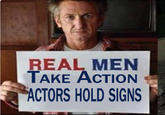

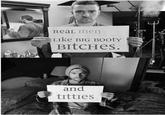
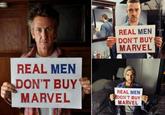


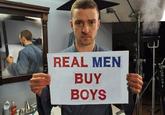
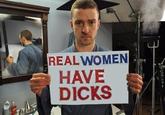


Top Comments
Spirit Coyote
Sep 16, 2014 at 02:19AM EDT
Telepohtah Goes Heeah
Sep 16, 2014 at 04:24PM EDT